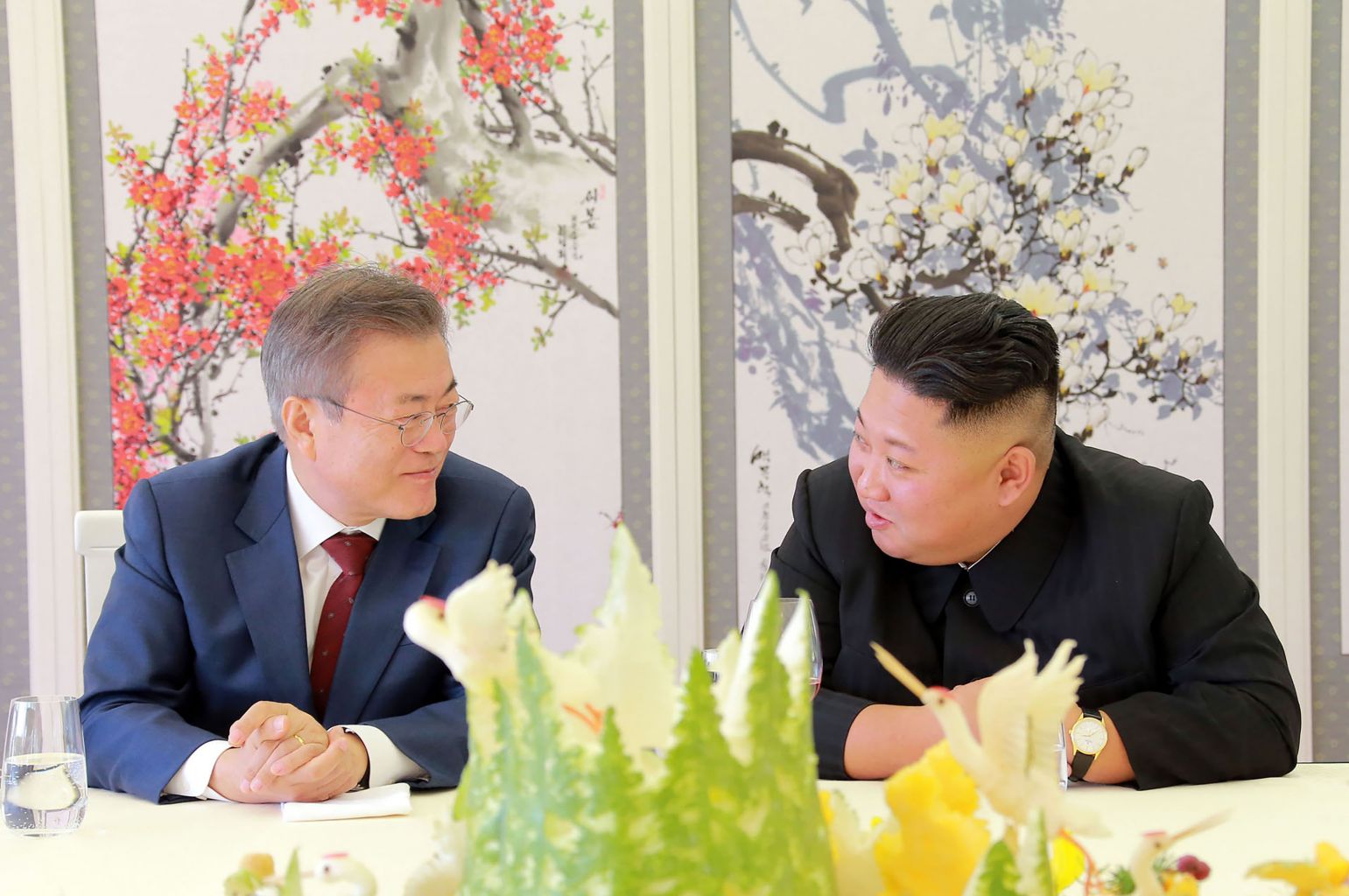Editorial Notes
Denuclearisation in sync: The Korea Herald
In its editorial, the paper says North Korean leader Kim Jong Un must promise substantial steps and South Korean President Moon Jae-in must not move hastily on inter-Korean relations.
Sign up now: Get insights on Asia's fast-moving developments

South Korean President Moon Jae-in (left) and North Korean leader Kim Jong Un during a visit to the Samjiyon guesthouse near Mount Paektu, North Korea, on Sept 20, 2018.
PHOTO: AFP
Follow topic:
SEOUL (THE KOREA HERALD/ASIA NEWS NETWORK) - The steps North Korea vowed to take to denuclearise after this week's summit with the South are moving in the right direction, but leave much to be desired.
South Korea's efforts to improve inter-Korean relations are moving too fast, regardless.
It is somewhat meaningful for North Korean leader Kim Jong Un to have mentioned "the Korean Peninsula without nuclear weapons and nuclear threats" in a public place with his own voice.
It is the first time that a member of the Kim family, which has ruled the North for three generations, has expressed any intention of denuclearising it. His words will be truly meaningful when they are actually carried out.
But substantial progress on denuclearising the state is tough to find in the joint statement that followed his summit with South Korean President Moon Jae-in.
The promises he made are to shut down a missile engine testing facility and launch pad in Tongchang-ri in the presence of experts. This he had already promised June 12 at the US-North Korea summit in Singapore.
The facility is actually useless, as North Korea has secured mobile launch pads. Mr Kim also promised to close down a key nuclear facility in Yongbyon for good, but attached strings by saying that the US needs to take corresponding measures first. North Korea is making enriched uranium somewhere secretly.
From the joint statement alone, the meaning of "corresponding measures" is ambiguous.
If it means the declaration of the official conclusion of the Korean War and both Pyongyang and Washington stick to their positions, their negotiations, even if resumed, will pick up where they left off and go around in circles, making little progress.
Pyongyang has demanded the declaration of the end of the war, while so far not responding to Washington's request for a list of its nuclear weapons and facilities to be inspected, stalling further negotiations.
It is likely that Mr Kim knows very well what steps the US demands from North Korea.
Washington has repeatedly made a point of insisting that the declaration of its inventory of nuclear weapons and facilities is a preliminary step.
The first step to making the Korean Peninsula free of nuclear weapons must be for the North to disclose how many nuclear weapons and facilities it has.
Denuclearisation is impossible without this step. However, at the summit, Mr Kim kept mum on this point and instead demanded corresponding measures.
That is not the attitude of a leader committed to denuclearising: avoiding the conversation while demanding corresponding measures as a condition for the destruction of a nuclear facility.
As far as the issue of denuclearising his country is concerned, Mr Kim has conceded as little as possible. He is trying to get more than he gives.
In spite of Mr Kim hardly moving to denuclearise, economic projects contained in the joint statement look ready to roll.
The two leaders agreed to start construction within this year to reconnect inter-Korean railways and roads.
Mr Moon and Mr Kim also agreed to "normalise" the Kaesong industrial park and the Kumgangsan tours once the proper conditions are in place. These projects themselves are in violation of UN sanctions against the North.
Unless these sanctions are lifted, their implementation is impossible. If Mr Moon really wanted to realise them, he should have urged Mr Kim to initiate substantial steps toward the dismantlement of all the North's nukes.
The military steps Mr Moon and Mr Kim agreed to take to reduce tensions are a double-edged sword. They can make practical contributions to peace, but there is a risk of undermining defence unless they are taken mutually and equitably, and are verified. Military issues have a direct impact on security.
Too many concessions in this area can lead to irreversible results. In light of weapons technology, South Korea has more to lose than North Korea does.
Mr Kim Byong-joon, interim leader of the main opposition and conservative Liberty Korea Party, said, "the joint statement has weakened our military, while leaving nuclear weapons in North Korea as they are."
The summit in Pyongyang ended with little substantial progress on denuclearisation - only the progress of inter-Korean relations is speeding up.
The Moon administration must not move hastily on inter-Korean relations, but must try to synchronise their progress with progress on denuclearisation.
The Korea Herald is a member of The Straits Times media partner Asia News Network, an alliance of 23 news media organisations.

